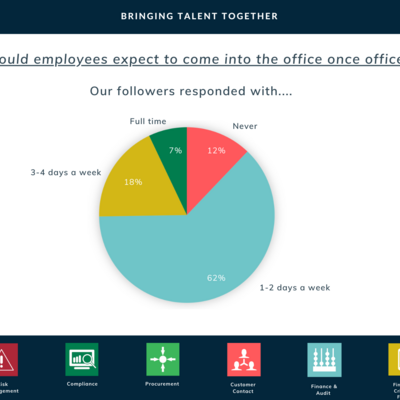Given that working from home is now considered the new normal in 2020, we were interested to discover office attendance trends moving forwards.
This is why we asked our LinkedIn followers how often they would like to come into the office on a permanent basis once they are able to fully reopen. A staggering 62% said they would like to visit the office one to two days a week.
Meanwhile, 18% said three to four days a week, seven per cent said full-time and 12% would be keen to never go in.
In support of our findings, a recent YouGov survey showed that many people will be reluctant to give it up working from home once the pandemic is over.
Prior to the outbreak, 68% of British employees never worked from home. Just one in three did, split between 13% who did so the whole time and 19% who did so some of the time.
However, once the crisis is over, the majority (57%) of those who were working before the outbreak and who intend to stay part of the workforce say they want to be able to continue working from home.
This is further bolstered by findings from a new report by KPMG and the Financial Services Skills Commission, which observed that half of the UK’s Financial Services workforce wants to work from home post-pandemic.
In support of this ethos, according to the fifth annual Financial Institutions Sentiment Survey from Lloyds Bank, almost all (89%) financial institutions plan to maintain flexible working patterns for employees and eight in ten (81%) expect to use digital platforms like Microsoft Teams and Zoom to liaise with clients. Two-thirds (68%) will use new technology to automate more work.
However, as we talk to our clients, the feedback overwhelmingly points to the fact that while they are happy to allow their employees to work on a more flexible basis, as demonstrated in the Lloyds Bank report, they would also like them to regularly attend the office.
This is because, according to the World Economic Forum, the top concerns of managers around remote teams is reduced team cohesiveness, less focus, a decrease in productivity, maintaining company culture, employees working overtime and the overall impact on their career pathway.
In fact, two thirds (68%) of Lloyds Bank survey respondents expect UK economic growth to slow in the year ahead, compared to 58% in 2019 and 29% in 2018. A similar proportion (62%) expect growth in the UK financial services sector to slow over the same period (55% in 2019 and 27% in 2018).
Now, the Coronavirus pandemic is seen as the top risk to financial institutions, as cited by 62% of business leaders, ahead of economic uncertainty, new regulation and Brexit, which was listed as 2019’s top risk.
The disparity between employee and employer expectations could prove problematic in future weeks and months as offices increasingly open their doors once again and face economic disruption.
It is also important to be mindful that this attitude towards eschewing the traditional face-to-face working format could well filter into the hiring, interview and onboarding process. This comes as firms increasingly rely on video conferencing technology to conduct business during the current lockdown restrictions.
In the short-term, it pays for candidates to show willing and be flexible in their attitude to working during this undoubtedly difficult time. A lack of adaptability could well impact negatively on employees during the current crisis, just as long as employers take steps not to compromise their overall safety and well-being or force them into doing something which makes them feel uncomfortable.
This is why it is vital for businesses to review their policies, communicate with their workers and implement frameworks, training and strategic goals which are realistic.
They must also recognise that there has been a huge leap forward in digitisation around remote working and upskill employees accordingly so that they can continue to do so effectively if they choose.
Taking these steps will also help to strike a good work/life balance and result in workers who are motivated and able to seamlessly operate at their optimum level.
Take a look at our infographic to see the full results of our poll right here.







